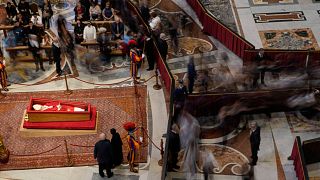Saudi Arabia
Magnetism Book is being presented to the public for the first time and is the latest in Ahmed Mater's Magnetism series of work.
One of the Arab world’s most important modern artists, Mater received a retrospective mid-career exhibition in London.
Drawing inspiration from the Holy Qur’an and other religious text, the artist uses iron filings and magnets to symbolize holy scripture.
An earlier work in the Magnetism series represents the Kaaba inside the Grand Mosque in Mecca with the human procession around the Black Stone represented by magnets and iron filings.
Another highlight is Boundary which takes the shape of a mihrab that indicates the direction of prayer in a mosque.
However, as the artist passes through the portal, an alarm sounds and red lights flash – a clear symbol of an airport security gate.
Many Islamic people have felt unfairly targeted at airport security, particularly since the 9/11 terror attacks, but the artist stops short at calling his piece a comment on racism or Islamophobia.
Dr Mater says: “With the art I would not go with the idea of direct racism. I’m not projecting very direct thought. For me art is a more philosophical, let’s take it from this side saying ‘What about the word in the dictionary called Islamophobia and why Islam is only connected with the phobia in the dictionary for example. So yes, it’s about surveillance and we build this in ourself.”
One of most commonly associated symbols of the artist’s home country is oil, and it features heavily in many of his works.
Evolution of Man is one of his most iconic pieces and is in fact a self-portrait of Mater taken with an X-Ray machine.
With a gun pointed at his head, the image slowly morphs into a fuel pump.
Other images show oil barrels and gas stations.
Dr Mater says: “Everyone says ‘oil country, oil country’ so really it was a statement that it’s not only that. If we think for ourselves we are an oil culture then it’s not…. It’s like a person who (commits) suicides and putting himself with this idea, so.”
The exhibition was curated by Christie's chairman of Middle East and Africa Dr Ridha Moumni.
He explains why he was so keen to showcase Dr Mater's works in London.
“Ahmed Mater is one of the most talented artists from Saudi Arabia and from the Arab world. When we wanted to do an exhibition here at Christie’s we wanted to display one of the most beautiful and intelligent artists from the region. And we also thought Ahmed Mater would be an artist who would bring people from the Middle East who will be here in the summer at Christie’s but also international visitors to discover what is the art, but also the social and cultural background in the Middle East through his art works," he says.
Mater's photographs of Mecca are described as 'observational' rather than critical.
He often uses wide angle lenses and captures the human drama from a distance, and often height.
The crowds of people at the Grand Mosque become tiny specks in the image and almost join as one in their shared spirituality.
Dr Mater's journey to the top of the Arabic art world did not begin in art school, in fact he trained and graduated as a medical doctor.
Dr Ridha Moumni says: “Ahmed Mater was a medical doctor and he has been developing a body of work on the human body, the human spirit and also humankind. And with that he has been developing a work around the spirituality and the link between humans and also God and in the case of Ahmed Mater, Allah.”
So how does Dr Mater feel about his background and blending the sciences with the arts?
“I like art, I feel art is more close to me, it’s something that can explain what I feel. And medicine I learn and study and graduated as a medical doctor. But when I work in the medicine, I learn that medicine is not only a science, medicine first is a common sense. It’s to meet people, it’s to greet your patient before thinking about medicine. So I learned that medicine, as a science, stands between subjectivity and objectivity – it has a big spiritual part," he explains.
Also on show are sculptures from a site-specific commission by Wadi AlFann, the valley of the Arts, in the desert if AlUla in north-west Saudi Arabia.
Ahmed Mater: Chronicles runs from 17 July until 22 August, 2024 at Christie’s in London and is free to the public.











01:01
Heathrow fire disrupts flights
02:20
London's taste for Africa
01:11
Vaccination Mandate for Umrah Pilgrims to Begin in 2025
01:48
Madrid to play City in Champions League knockout playoffs amid Vinicius rumors
00:55
Mohamed Salah reportedly set for record offer from Saudi Arabian team
01:00
London underground users bare their legs for Official No Trousers Tube Ride